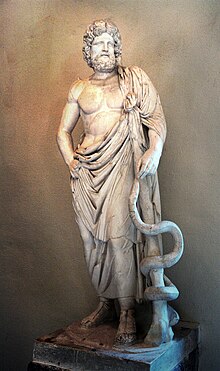| Asclepius | |
|---|---|
God of medicine, healing, rejuvenation and physicians | |
 Asclepius with his serpent-entwined staff, Archaeological Museum of Epidaurus | |
| Abode | Mount Olympus |
| Symbol | Serpent-entwined staff |
| Genealogy | |
| Parents | Apollo and Coronis |
| Siblings | half-siblings of Asclepius |
| Consort | Epione |
| Children | |
| Equivalents | |
| Etruscan | Vejovis |
| Roman | Aesculapius |
| Egyptian | Imhotep |
| Phoenician | Eshmun |
| Part of a series on |
| Ancient Greek religion |
|---|
 |
Asclepius (/æsˈkliːpiəs/; ‹See Tfd›Greek: Ἀσκληπιός Asklēpiós [asklɛːpiós]; Latin: Aesculapius) is a hero and god of medicine in ancient Greek religion and mythology. He is the son of Apollo and Coronis, or Arsinoe, or of Apollo alone. Asclepius represents the healing aspect of the medical arts; his daughters, the "Asclepiades", are: Hygieia ("Health, Healthiness"), Iaso (from ἴασις "healing, recovering, recuperation", the goddess of recuperation from illness), Aceso (from ἄκεσις "healing", the goddess of the healing process), Aegle (the goddess of good health) and Panacea (the goddess of universal remedy). He has several sons as well. He was associated with the Roman/Etruscan god Vediovis and the Egyptian Imhotep.[1] He shared with Apollo the epithet Paean ("the Healer").[2] The rod of Asclepius, a snake-entwined staff similar to the caduceus, remains a symbol of medicine today. Those physicians and attendants who served this god were known as the Therapeutae of Asclepius.
- ^ Pinch, Geraldine (1 January 2002). Handbook of Egyptian Mythology. ABC-CLIO. ISBN 9781576072424.
- ^ Mitchell-Boyask, p. 141